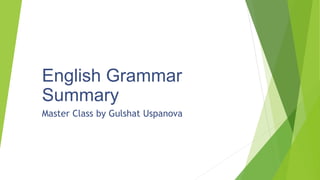
English Grammar for Beginners
- 1. English Grammar Summary Master Class by Gulshat Uspanova
- 2. Topics covered Introduction Games Parts of speech Verbs: Past, Present, Future Tenses/ Passive & Active Voice Modal verbs The Verb “To Be” Phrases starting with place & time Sentence order Dialogues, texts
- 3. Parts of Speech 1) Articles 2) Nouns 3) Pronouns 4) Adjective/ Adverbs 5) Verbs 6) Particles
- 4. Articles A (A short of One) – used with the singular common noun, showing that this noun is one of many E.g. A boy – a random boy out of many The – the proper singular or plural noun, pointing at particular object E.g. The boy – a particular boy/boys at whom you can point at, or the person, that you are talking to, knows exactly whom you are talking about.
- 5. Nouns Nouns are part of speech – words with their own meanings, independent of time and answering questions What? and Who? E.g. A Table, A Chair, A boy, The mall, Coffee 1) Countable (pencils, cars, books), Articles A & The to be used 2) Non-countable (sugar, flour, salt), only The Article to be used
- 6. Pronouns Simple Pronouns Person Singular Plural 1st person I/Me We/Us 2nd person You You 3rd person He/Him, She/Her, It They/ Them Possessive pronouns Person Singular Plural 1st person My, Mine Our, Ours 2nd person Your, Yours Your Yours 3rd person His, Its, Her Hers Their, Theirs Interrogative Pronouns Whose? Whom? Who?
- 7. Adjectives/ Adverbs Adjective – word describing/ giving characteristic to a noun Answers the question What? Which? e.g. a beautiful woman Adverbs – an word describing how action was done, Answers the question How? Is constructed as “Adjective + ly” e.g. He decorated it nicely
- 8. Particles Particles – words that do not have any sense/meaning on their own, and need to be connected to a Noun, pronoun or Verb to make sense E.g. On the table, under the bed, over the bridge, by the tree
- 9. Verbs Verbs are the words with their own meanings of action being done, dependent on time, answers questions about actions – Does/do/did what? Is/Are/Were/Was doing what? What is it?
- 10. Past, Present, Future Tenses Past, Present, Future Tense Simple -Actions are done regularly -Action was/will be done as a fact in the past/future Continuous - Actions are/were done from _ to_ period Perfect -Action have been continuously done and had just finished
- 11. Verb endings for Simple Tense Past Present Future 1st person I did/played I/ we do I /we shall do 2nd person You did/played You do You will do 3rd person He/she/it did/played They did/played He/she/it does/plays They do He/she/it/they Will do
- 12. Modal Verbs Can/ Could (past) (Physically) • E.g. He can climb up the tree May/Could (Potentially) • I May come to the party Might (Possible) Must (Have to) • I might travel to New York next week • Do not Accept the Verbs in Infinitive form after them • I must be there on time
- 13. To Be Past Present Future 1st person I was/ we were I am/ we are I /we shall be 2nd person You were You are You will be 3rd person He/she/it was They were He/she/it is They are He/she/it/they Will be
- 14. There is/There are If the sentence starts with the place or time, then use the phrase There is – there are- there was, etc. E.g. There is a mall in IMPZ There were many balloons on the girls party
- 15. Sentence Order For Positive Sentence Subject + Action + Object E.g. The boy opened the box Boy’s mother prepares kid’s lunchboxes For interrogative Sentences Action/supplementary verb + Subject + Action verb itself + Objects E.g. Are you coming to the football match today?
- 16. Any Questions?
